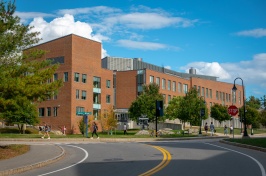UNH Research Finds Four in 10 Children Continue to Live in Low-Income Families
DURHAM, N.H. - While child poverty nationwide declined between 2013 and 2014, new research from the Carsey School of Public Policy at the University of New Hampshire finds that 21.7 percent of children still lived in poor families in 2014. Nearly 10 percent lived in deep poverty and overall the share of poor and low-income children was higher in 2014 than at the official end of the Great Recession in 2009.
According to the 2014 American Community Survey the nationwide drop in poverty was not uniform across the country. The number of children living in poor families rose in four states that have low child poverty rates - Alaska, Minnesota, New Hampshire and North Dakota -and the share of children living in deep poverty rose in Maine and North Dakota.
"That nearly seven million American children are living in deeply poor homes highlights the necessity of the social safety net," the researchers said. "It is important to note that although policy interventions like tax credits or other work supports may improve the quality of life for many children, the impact of these interventions may not show up in official poverty statistics as they do not consider these supports in their calculations."
As a result of the limitations of the official poverty statistics, the researchers advocate for policy makers to consider using the Supplemental Poverty Measure or additional calculations in assessing the efficacy of safety net efforts. In addition, the official poverty measure does not make adjustments for family income purchasing power despite tremendous variation in the cost of living across the nation.
"Given dramatic differences in the cost of living across the nation, it may be worth making or increasing geographic adjustments to a host of safety net programs," the researchers said.
The research was conducted by Jessica Carson, vulnerable families research scientist at the Carsey School; Andrew Schaefer, a doctoral student in sociology and a vulnerable families research associate at the Carsey School; and Beth Mattingly, director of research on vulnerable families at the Carsey School and research assistant professor of sociology at UNH. The full report can be found here: https://carsey.unh.edu/publication/2014-low-income-families
The Carsey School of Public Policy is nationally acclaimed for its research, policy education and engagement aimed at addressing important societal challenges. The school takes on the pressing issues of the 21st century, striving for innovative, responsive and equitable solutions at all levels of government and in the for-profit and nonprofit sectors.
The University of New Hampshire, founded in 1866, is a world-class public research university with the feel of a New England liberal arts college. A land, sea, and space-grant university, UNH is the state's flagship public institution, enrolling 13,000 undergraduate and 2,500 graduate students.
Latest News
-
October 24, 2025
-
October 8, 2025
-
October 2, 2025
-
September 24, 2025
-
September 15, 2025















































